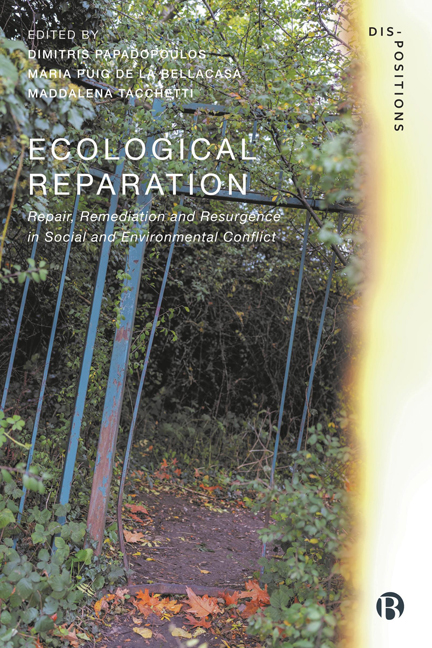Book contents
- Frontmatter
- Contents
- List of Figures
- Notes on Contributors
- Acknowledgements
- Note on the Figures
- Dis-Positions Series Preface
- Introduction: No Justice, No Ecological Peace: The Groundings of Ecological Reparation
- PART I Depletion<>Resurgence
- PART II Deskilling<>Experimenting
- PART III Contaminating<>Cohabiting
- PART IV Enclosing<>Reclaiming Land
- PART V Loss<>Recollecting
- PART VI Representing<>Self-governing
- PART VII Isolating<>Embodying
- PART VIII Growth<>Flourishing
- Index
17 - Curating Reparation and Recrafting Solidarity in Post-Accord Colombia
Published online by Cambridge University Press: 28 March 2024
- Frontmatter
- Contents
- List of Figures
- Notes on Contributors
- Acknowledgements
- Note on the Figures
- Dis-Positions Series Preface
- Introduction: No Justice, No Ecological Peace: The Groundings of Ecological Reparation
- PART I Depletion<>Resurgence
- PART II Deskilling<>Experimenting
- PART III Contaminating<>Cohabiting
- PART IV Enclosing<>Reclaiming Land
- PART V Loss<>Recollecting
- PART VI Representing<>Self-governing
- PART VII Isolating<>Embodying
- PART VIII Growth<>Flourishing
- Index
Summary
Entanglements of injustice
She was a mother. The past tense is to some extent accurate. Her 19-year-old son left the house one day quite excited about finding a new job and never came back. The next time she saw him, his dead body was wearing strange clothes. ‘Guerrillero’ the media, the Army and the President called him. The newspapers were wrong, the militaries were wrong, former president Uribe was wrong and she knew it. Twenty years later a controversial Human Rights Watch Report proves her right, as it does to many other Madres de Soacha. Nowadays she marches with other mothers in her situation, even in times of lockdowns. The pandemic has not taken away her pain, memories, and the need for justice.
While marching in the streets of Bogotá, her path comes across other mothers, their partners and children, all of whom embody a different kind of pain. They have walked endless distances to reach this unwelcoming place. They are sometimes mistaken for Desplazados, but their Venezuelan accent gives them away. They were displaced from their homes by dispossession, violence, and hunger. They also march, but not to protest as their right to do it is sometimes considered illegitimate. They march to cross the Colombian-Venezuelan border, and to endure subsequent bureaucratic borders. As other people on the move within the country, they arrive in the cities and inhabit the streets of Bogotá where the stories of this chapter become more visible.
State crimes like the ones perpetrated against Madres de Soacha and their sons, also known as the Falsos Positivos case, are not new. Falsos Positivos is the name given by the media to at least 6400 young men assassinated by the Colombian Army after being dressed up as guerilla militants (JEP, 2021). It is claimed that these assassinations were motivated by an incentive system promoted during the Presidency of Alvaro Uribe between 2002 and 2008, offering soldiers financial rewards for every guerilla casualty. Similarly, displacements due to violence and precarity are not new either. The increasing cases of Venezuelan nationals arriving in Colombia adds to the existing number of people usually addressed as Desplazados, or Internally Displaced People.
- Type
- Chapter
- Information
- Ecological ReparationRepair, Remediation and Resurgence in Social and Environmental Conflict, pp. 258 - 272Publisher: Bristol University PressPrint publication year: 2023

